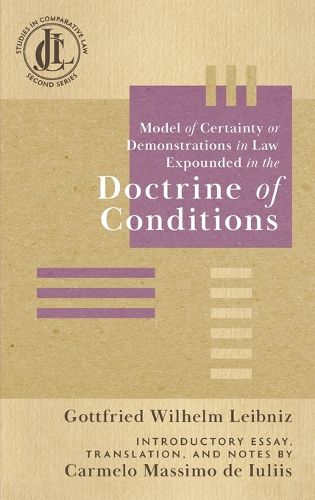Readings Newsletter
Become a Readings Member to make your shopping experience even easier.
Sign in or sign up for free!
You’re not far away from qualifying for FREE standard shipping within Australia
You’ve qualified for FREE standard shipping within Australia
The cart is loading…






This title is printed to order. This book may have been self-published. If so, we cannot guarantee the quality of the content. In the main most books will have gone through the editing process however some may not. We therefore suggest that you be aware of this before ordering this book. If in doubt check either the author or publisher’s details as we are unable to accept any returns unless they are faulty. Please contact us if you have any questions.
JCL Studies in Comparative LawSecond Series, No. 9Model of Certainty, Or Demonstrations in Law Expounded in the Doctrine of ConditionsFirst published in 1669, The Doctrine of Conditions (Doctrina Conditionum) is a unique, unprecedented collection of Roman and canon law rules regarding the application of conditions in contract, inheritance and marriage law. Leibniz not only gathers these norms, scattered in a disordered way throughout the law of Justinian and the Roman pontiffs, but also derives from them 70 theorems that structure the entire field of conditional law. The work, which is published here in its first complete English translation, is still valued today for its attempt to distill these norms into dogmatic principles and as a perfect monographic course on Roman law, which is predominant in its focus, concerning the law of conditions.Gottfried Wilhelm Leibniz [1646-1716] is best known as a philosopher and mathematician, but he was also a distinguished jurist. Among his most significant legal works are De Casibus Perplexis in Jure (1666), a review of celebrated complex cases in Roman law, Nova Methodus Discendae Docendaeque Jurisprudentiae (1667), which not only provides didactic guidance on the teaching of law but also includes one of the first brilliant systematic reconstructions of the law concerning attorneys, and Doctrina Conditionum (1669), an attempt to axiomatize the ius commune of conditions in law. He also contributed to international law by drafting the Codex Juris Diplomaticus (1693-1700), a collection of treaties and other materials relating to the diplomatic history of the Guelph states that addressed problems related to sovereignty, diplomacy and the precedence of states within the Holy Roman Empire.Carmelo Massimo de Iuliis is a professor of corporate law at the Catholic University of Milan and a lawyer admitted to practice before the higher courts of Italy and the European Union. He has teachingexperience in international universities and is the author of several publications, also in a comparative perspective. Driven by a strong interest in the history and philosophy of law, he produced the first English translation of another significant legal work by Leibniz, Nova Methodus Discendae Docendaeque Jurisprudentiae (The New Method of Learning and Teaching Jurisprudence), for Talbot Publishing (2017).lix, 374 pp.
$9.00 standard shipping within Australia
FREE standard shipping within Australia for orders over $100.00
Express & International shipping calculated at checkout
Stock availability can be subject to change without notice. We recommend calling the shop or contacting our online team to check availability of low stock items. Please see our Shopping Online page for more details.
This title is printed to order. This book may have been self-published. If so, we cannot guarantee the quality of the content. In the main most books will have gone through the editing process however some may not. We therefore suggest that you be aware of this before ordering this book. If in doubt check either the author or publisher’s details as we are unable to accept any returns unless they are faulty. Please contact us if you have any questions.
JCL Studies in Comparative LawSecond Series, No. 9Model of Certainty, Or Demonstrations in Law Expounded in the Doctrine of ConditionsFirst published in 1669, The Doctrine of Conditions (Doctrina Conditionum) is a unique, unprecedented collection of Roman and canon law rules regarding the application of conditions in contract, inheritance and marriage law. Leibniz not only gathers these norms, scattered in a disordered way throughout the law of Justinian and the Roman pontiffs, but also derives from them 70 theorems that structure the entire field of conditional law. The work, which is published here in its first complete English translation, is still valued today for its attempt to distill these norms into dogmatic principles and as a perfect monographic course on Roman law, which is predominant in its focus, concerning the law of conditions.Gottfried Wilhelm Leibniz [1646-1716] is best known as a philosopher and mathematician, but he was also a distinguished jurist. Among his most significant legal works are De Casibus Perplexis in Jure (1666), a review of celebrated complex cases in Roman law, Nova Methodus Discendae Docendaeque Jurisprudentiae (1667), which not only provides didactic guidance on the teaching of law but also includes one of the first brilliant systematic reconstructions of the law concerning attorneys, and Doctrina Conditionum (1669), an attempt to axiomatize the ius commune of conditions in law. He also contributed to international law by drafting the Codex Juris Diplomaticus (1693-1700), a collection of treaties and other materials relating to the diplomatic history of the Guelph states that addressed problems related to sovereignty, diplomacy and the precedence of states within the Holy Roman Empire.Carmelo Massimo de Iuliis is a professor of corporate law at the Catholic University of Milan and a lawyer admitted to practice before the higher courts of Italy and the European Union. He has teachingexperience in international universities and is the author of several publications, also in a comparative perspective. Driven by a strong interest in the history and philosophy of law, he produced the first English translation of another significant legal work by Leibniz, Nova Methodus Discendae Docendaeque Jurisprudentiae (The New Method of Learning and Teaching Jurisprudence), for Talbot Publishing (2017).lix, 374 pp.